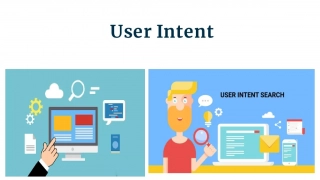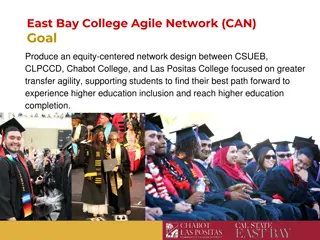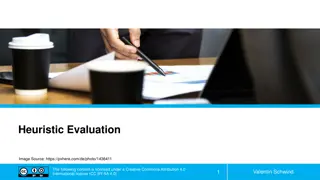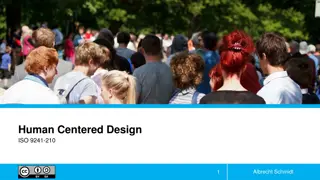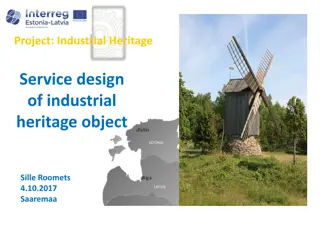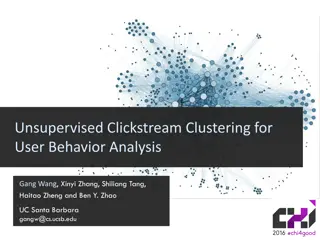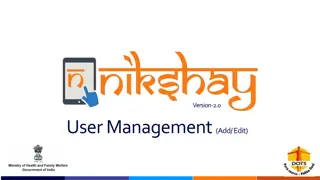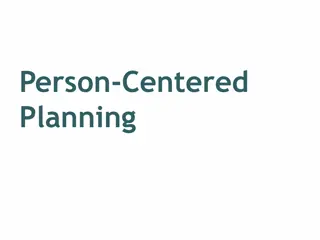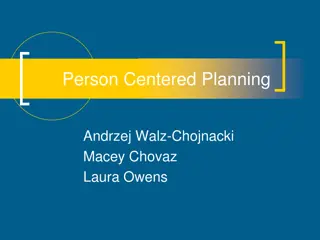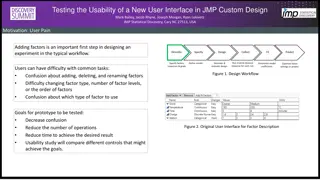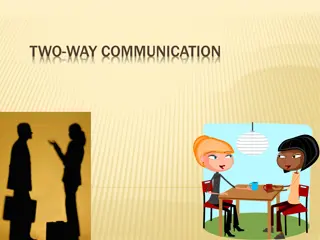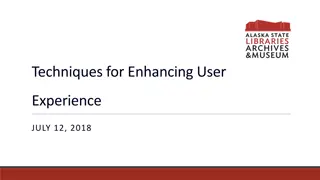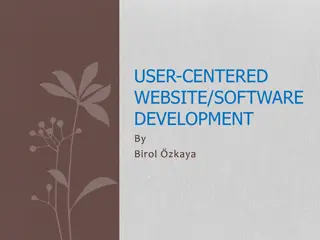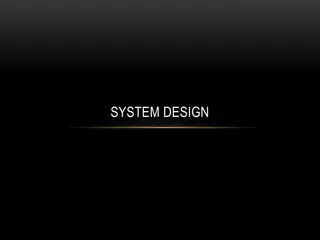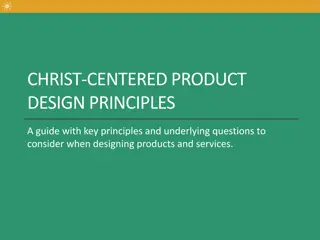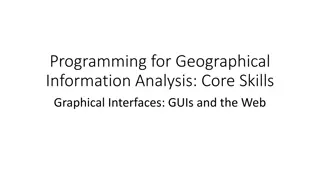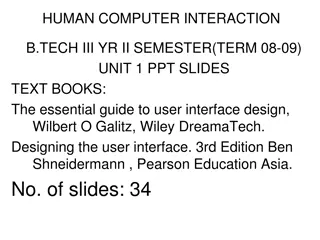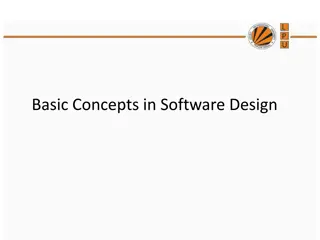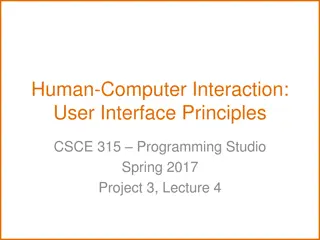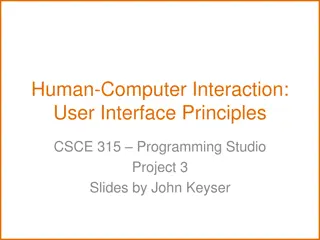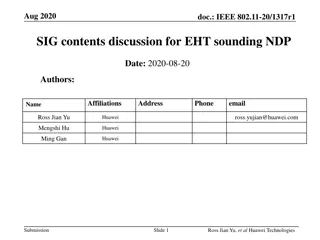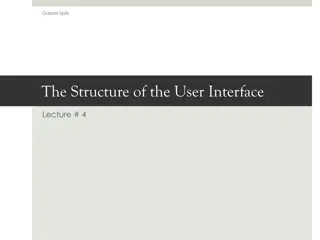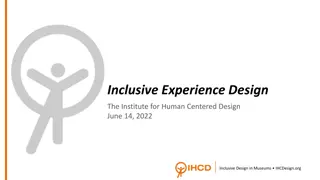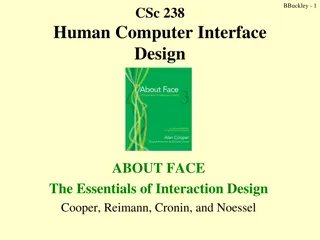Maximizing Impact: The Role of Rich Snippets in SERPs"User Intent
User intent, also known as search intent, refers to the underlying goal or purpose a user has when performing an online search. It goes beyond the literal interpretation of keywords and focuses on understanding why a person is searching. Recognizing and catering to user intent is crucial for creatin
3 views • 10 slides
Safeguarding Focal Point Training: Person-Centered Approach and Confidentiality
Understanding the principles of a person-centered approach, confidentiality, and consent is crucial in safeguarding training. This training focuses on addressing safety concerns, conducting investigations, and maintaining confidentiality. Ground rules ensure respectful participation and sensitive is
0 views • 24 slides
Equity-Centered Agile Network Design for Higher Education Inclusion
The East Bay College Agile Network (CAN) aims to create an equity-centered network design between CSUEB, CLPCCD, Chabot College, and Las Positas College to enhance transfer agility and support students in finding their best path towards higher education inclusion and completion. The network focuses
0 views • 31 slides
Person-Centered Thinking in Direct Care Services
Providing Person-Centered Care is essential, especially during challenging times like COVID-19. This training focuses on understanding residents' needs, using behavioral and nonverbal indicators to improve care quality, and embracing a strength-based approach. Learn about Person-Centered Thinking, C
0 views • 24 slides
Understanding Heuristic Evaluation in User Interface Design
Heuristic evaluation is an analytical method where experts evaluate interfaces based on usability principles. This evaluation helps in identifying potential design issues that may impact user satisfaction. The process involves a small group of evaluators reviewing the interface against a set of reco
5 views • 12 slides
Software Engineering Design Principles and Concepts
The chapter discusses the essential principles and concepts in software design, highlighting the four key design models - data design, architectural design, interface design, and component-level design. It emphasizes the importance of traceability to the analysis model, minimizing the gap between so
0 views • 36 slides
Understanding Human-Centered Design in ISO 9241-210 by Albrecht Schmidt
Explore the differences between User-Centered Design (UCD) and Human-Centered Design (HCD) as per ISO 9241-210 standards. Delve into the principles and activities of HCD, the rationale for adopting it, and its significance within interactive systems. Learn why HCD emphasizes the holistic perspective
0 views • 17 slides
Implementing Alert Messages and User Input Handling in Java
This tutorial guides you through creating alert messages, handling user input, defining functions, calling functions from the `onCreate` method, and creating an XML file for user data entry validation in Java. Learn how to display alerts for empty user credentials and process user actions accordingl
1 views • 6 slides
Enhancing Industrial Heritage Through Customer-Centric Service Design
In the realm of industrial heritage, the design of objects like the one by Sille Roomets brings a unique blend of art and intuition. Connecting service design with marketing is emphasized, focusing on a user-centered approach that aims to make eyes sparkle, both for customers and providers. Understa
0 views • 16 slides
Unsupervised Clickstream Clustering for User Behavior Analysis
Understanding user behavior in online services is crucial for businesses. This research focuses on utilizing clickstream data to identify natural clusters of user behavior and extract meaningful insights at scale. By analyzing detailed user logs, the study aims to reveal hidden patterns in user inte
0 views • 19 slides
Efficient User Management System for Health Facilities
Record and manage user details effectively with the new Version 2.0 User Management feature. RNTCP has now registered over 35,000 PHIs, 140,000 Private Health Facilities, 15,000 Private Labs, 31,000 Private Chemists, across 700 Districts and 8,000 TUs in Nikshay. Enhance operations by editing TU pro
0 views • 26 slides
Understanding Agile User Stories in Software Development
Agile user stories play a crucial role in software development by providing short descriptions of features desired by customers in a language they understand. This method allows for agile planning, efficient documentation, and effective communication between development teams and clients. Extracting
0 views • 30 slides
Understanding Person-Centered Planning for Individualized Program Plans
Explore the core values, importance, and practical applications of person-centered planning in developing Individual Program Plans (IPPs) for individuals with developmental disabilities. Learn about the required process, underlying values, different approaches, and the influence of person-centered p
4 views • 11 slides
Understanding Person-Centered Planning for Future Success
Person-centered planning is a creative process that helps individuals, such as young adults, develop plans for how they want to live in the future. It involves aligning visions, goals, and actions while focusing on the person's strengths, relationships, and community involvement. Unlike traditional
0 views • 45 slides
Understanding Person-Centered Care in Healthcare Research
Explore the concepts of person-centered care in healthcare research, focusing on key differences from problem-oriented care, emerging research questions, methodological considerations, and implications for study populations, interventions, and outcomes. Learn about the definition of patient-centered
2 views • 52 slides
Exploring Usability Testing of New Interface in JMP Custom Design
In this study by Mark Bailey et al. from JMP Statistical Discovery in the USA, the focus lies on testing the usability of a new user interface using JMP Custom Design. The researchers highlight the significance of adding factors in the initial experiment design workflow to enhance user experience. U
0 views • 8 slides
Enhancing Group Communication and Facilitation Techniques
Effective two-way communication is essential for facilitating group activities, negotiating, resolving conflicts, and engaging in online communications. Understanding group behaviors such as task-centered, people-centered, and self-centered can help in effectively managing meetings and group interac
0 views • 18 slides
Enhancing User Experience Through Data Trails and Metrics
Andrea Thompson, a Sr. User Experience Manager at The Home Depot, highlights the importance of measuring and analyzing user experience metrics to understand and improve customer interactions. By investigating data trails from various touchpoints, such as customer sign-ups, interactions with associat
0 views • 17 slides
Techniques for Enhancing User Experience in Public Libraries
Reimagine the public library as a community hub that promotes development and learning. Explore designs that impact user experiences, from open spaces to creative learning environments. Discover user-centered design processes and the significance of touchpoints in shaping customer perceptions.
0 views • 45 slides
Material Design: Combining Classic Design Principles with Technological Innovation
Material Design is a design language that combines traditional design principles with the possibilities offered by technology and science. It emphasizes visual language, classic design elements, and innovation to create delightful user experiences. The Material Metaphor, Imagery, Typography, Color,
0 views • 34 slides
Principles and Schemes of User-Centered Website Development
User-centered website development focuses on goals of human-computer interaction, content organization, and visual organization. Explore safety, utility, effectiveness, efficiency, usability, and appeal. Learn about different organizational schemes like alphabetical, chronological, geographical, top
0 views • 20 slides
Understanding Person-Centered Thinking for Families
Person-Centered Thinking is essential for supporting loved ones in long-term care settings. This primer explores the impact of Person-Centered Thinking on individuals, how to recognize its effectiveness, and ways to promote a culture change in care communities. By prioritizing respect, dignity, info
0 views • 20 slides
Comprehensive Guide to System Design Components and Techniques
System design involves the detailed planning and identification of components in an information system, aiming to provide users with a general understanding of the new system. This process includes techniques like flowcharts, prototyping, and component design, covering aspects such as output design,
0 views • 24 slides
Christ-Centered Product Design Principles Guide
This guide focuses on designing products and services with Christ-centered principles in mind, aiming to impact clients holistically, including spiritually. It emphasizes the importance of intentional design to reflect Christ and His Kingdom. Key questions and strategies are provided to create produ
0 views • 7 slides
Introduction to Graphical User Interfaces (GUIs) in Python for Geographical Information Analysis
This content provides insights into creating Graphical User Interfaces (GUIs) in Python for Geographical Information Analysis. It covers the basics of GUI development using TkInter and event-based programming with a focus on user experience design and functionality. The lecture emphasizes the import
0 views • 45 slides
Importance of Human-Computer Interaction (HCI) in User Interface Design
Human-Computer Interaction (HCI) is a crucial discipline focusing on creating interactive computing systems that are user-friendly and efficient. This involves designing, evaluating, and implementing systems that cater to users' needs, ultimately improving user satisfaction and productivity. The fie
0 views • 39 slides
Understanding Basic Concepts in Software Design
Software design involves transforming customer requirements into a form suitable for implementation, with activities categorized into preliminary and detailed design stages. High-level design focuses on module identification and control relationships, while detailed design entails defining data stru
1 views • 24 slides
User Interface Design Principles in Human-Computer Interaction
User interface design principles are crucial in Human-Computer Interaction. This content highlights key principles such as aesthetics, anticipation, autonomy, and color consideration for users with color blindness. It emphasizes the importance of user testing, user autonomy, and providing essential
0 views • 24 slides
Understanding Use Cases and Actors in System Design
Explore the concept of use cases in system design, including user goals versus interactions, system boundaries, actors, and how they all come together in use case diagrams. Learn how use cases capture user-visible functions, achieve discrete goals, and represent the interactions between actors and t
0 views • 20 slides
Principles of User Interface Design in Human-Computer Interaction
User interface design principles play a crucial role in Human-Computer Interaction, emphasizing the importance of aesthetics, anticipation, autonomy, color usage, and consistency in creating effective interfaces. These principles guide designers in crafting interfaces that are visually appealing, us
0 views • 24 slides
Understanding Interaction Design in Human-Computer Interaction
Interaction design focuses on creating interactive products that are easy, effective, and enjoyable to use. It aims to reduce negative user experiences while enhancing positive ones. Designing interactive products requires understanding user activities, interfaces, and device arrangements to support
0 views • 11 slides
IEEE 802.11-20/1317r1 EHT-SIG Proposal Discussion
The document discusses EHT-SIG for single-user and sounding NDP in IEEE 802.11-20/1317r1, focusing on overflow bits, user fields, CRC, and tail formats. It covers the format details, subfields, and overhead compared to HE sounding, proposing specific bit allocations for different elements. The EHT-S
0 views • 16 slides
Family Centered Services of CT: Empowering Youth through TOP Sessions & Community Service
Family Centered Services of CT, led by Executive Director Cheryl Burack, offers a nationally-replicated youth development program focusing on teen pregnancy prevention and academic success. Through TOP Sessions, 15-17-year-olds engage in guided discussions, community service learning, and individual
0 views • 8 slides
Administrator Deletes User - User Management System Storyboard
An administrator navigates through a user list, selects a user for deletion, confirms the action, and successfully removes the user from the system. The process involves interacting with user details, confirming the deletion, and updating the user list accordingly in a structured manner.
0 views • 4 slides
Understanding User Interface Design Basics
Explore the fundamental aspects of user interface design, including design elements, user interactions, and conceptual models. Learn about the framework needed for driving customer experience, different design aspects, and the concept of an interface. Discover how to create a high-level metaphor, st
0 views • 24 slides
Enhancing Care Coordination for Improved Patient Referral Experiences
Explore the importance of patient-centered referral experiences, highlighting the impact of effective care coordination on patient outcomes. Contrasting cases illustrate the difference between non-patient-centered and patient-centered referral processes. Learn actionable steps to ensure all stakehol
0 views • 52 slides
Inclusive Experience Design: Enhancing Cultural Accessibility
The Institute for Human Centered Design is a 44-year-old non-profit organization dedicated to enhancing experiences for people of all ages, abilities, and cultures through excellence in design. Their core beliefs emphasize the impact of design on daily lives and the importance of designing for inclu
0 views • 19 slides
ICPAC Guide to Co-produced Climate Services
ICPAC has extensive experience in bridging science and application in climate services, leading to the creation of the ICPAC Guide to Co-produced Climate Services. This guide illustrates practical ways of applying co-production approaches in the Eastern Africa region, emphasizing multi-stakeholder e
0 views • 5 slides
User Interface vs User Experience: Understanding the Essentials
Exploring the distinctions between User Interface (UI) and User Experience (UX) in human-computer interaction design. UI focuses on the space of interaction between humans and machines, while UX encompasses users' behavior, attitude, and emotions towards a product or service. The goal is to create i
0 views • 63 slides
Understanding Context Switching and User-Kernel Interaction in Operating Systems
Context switching in operating systems involves a seamless transition between user-level threads without the kernel's awareness. User-level code manages register state and stack pointers, while user-kernel mode switching requires changing processor privilege levels and agreement on information excha
0 views • 25 slides
